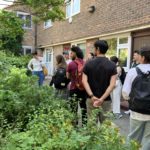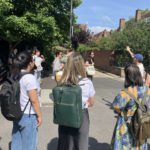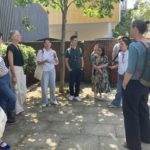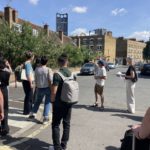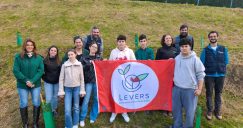What can we learn from this London neighbourhood – as it prototypes a collaborative, sustainable and just local food system?
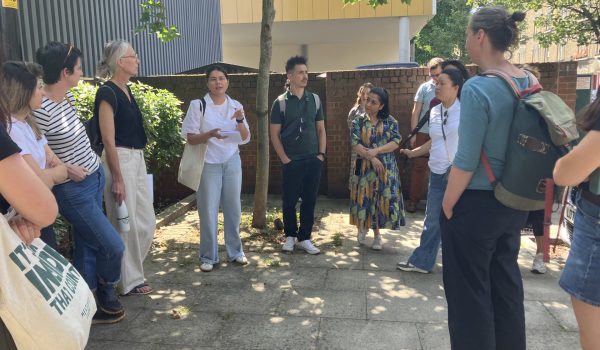
- Article, News, UK
There’s an experiment going on in a small pocket of South London. Led by Pembroke House, a South London charity, it’s called the Walworth Neighbourhood Food Model.
Their climate action project creates another opportunity – for learning and exchange. This year our events-led climate learning initiative – First Hand – has visited twice, taking two groups of professionals, including local authorities and food innovation experts for authentic, experiential learning sessions, exchanging ideas and practicing skills.
One place, three objectives
LEVERS advocates for Open and Place-based Learning, knowing that rooting climate learning in real-life contexts makes climate justice issues more tangible and fosters ‘environmental citizens’ (Schild, 2016).
First Hand, the UK Learning Venture created by Forth, has developed a simple and effective approach to the creation of local learning experiences. Each of our learning experiences promises to do 3 things:
- Inform: Demonstrate green skills and competences by real people and places making change on the ground. This connects theory with practice, establishes a shared language and ensures we’re all talking about the same things as we build our skills.
- Inspire: Stretch our understanding of what’s possible and relate extraordinary achievements to (relatively) ordinary people.
- Connect: Expand networks, find partners, mentors, talent and fellow travelers.
Walworth Neighbourhood Food Model
Walworth Neighbourhood Food Model is an established local network and activity programme which creates and supports spaces, projects and relationships. It includes:
- A community space that build momentum for urban food system change at Pembroke House.
- Projects that demonstrate success in engaging local communities and influence policy change towards food cultivation – such as Right To Grow.
- An action learning network of local food actors, from the local non-profit Fareshares – an ethical food coop that’s been around since 1988 to Walworth Garden, a community garden which successfully combines retail, training, contracting and creation of local amenity space.
- Food actor mapping – a method developed by Pembroke House, now being shared with researchers at London South Bank University.
Together, these projects form the beginnings of an infrastructure for a fairer, more resilient food system at neighbourhood level.
What Walworth can teach us all
First Hand co-created an open learning experience with Pembroke House to shape a local itinerary with the dual objectives of sharing their authentic story (inspiring) and creating talking points or anchors for learning about green skills and green competencies (informing). The whole learning experience was designed to maximise points of interaction and peer-learning within the groups (connecting)
What was learned? Well you had to be there to get the hard won lessons, insights and tools that were shared. But there were three themes which we circled again and again:
- Networks and partnerships are central to making any collective action possible. To work effectively outside the boundaries of single organisations means they are the work – not a byproduct. This entails both soft skills – communication and relationships – and hard skills – governance and legal structures – are at a premium.
- Decision-making is likely to need to change to create space for new voices and fairer outcomes. Knowing this, and spending time exploring options is a worthwhile investment.
- Small, less formal local projects can inform big, international, bureaucratic ones and vice versa. There are more parallels than one might assume – if we’re blind to them we limit ourselves at a time when we need all the resources we can find.
The only way is open
No single organisation can deliver climate mitigation, adaptation or resilience at the scale and pace we need, we need to work and learn from and with each other. This is a paradigm shift; learning how to achieve it will happen in real life, and in real places rather than universities and colleges. That means places will increasingly be our classrooms, for learning new skills, from and with each other in the real-world.
Our experiences at Walworth Neighbourhood Food Model, and the wider sites opened as part of the First Hand Learning Venture, demonstrate how neighbourhoods can be testbeds and teaching grounds at the same time.

